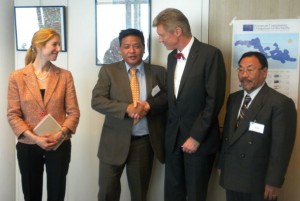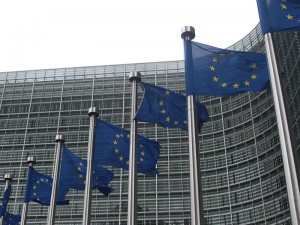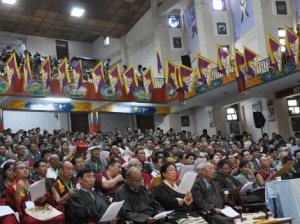The bi-annual European Union -China Summit, which commenced in Brussels on the 20th of September, presented Tibetans the world over with a subject of anticipation. The meeting focused primarily on bilateral ties and global issues, particularly the Eurozone debt crises and China’s concern about EU trade tariffs, but also broached the issue of grave human rights violations in Tibet.
The Speaker of the Tibetan Parliament-in-Exile Mr. Penpa Tsering, visited Brussels and Amsterdam, meeting with Dr. Gerhard Sabathil, Director of East Asia and the Pacific of the European External Action Service (EEAS). During the meeting Mr. Sabathil was briefed on the current situation in Tibet, particularly the spate of unfortunate self-immolations which has grown to more than 50 cases so far. Emphasis was also put on repressive Chinese policies that will have adverse and lasting repercussions on all spheres of Tibetan people’s rights in Tibet. Dr. Sabathil, in return, assured that the EEAS would raise the topic with China at the summit, and added that they have been keeping track of the situation in Tibet.
Numerous NGOs and human rights organizations have echoed similar appeals and demands to the EU’s new Special Representative for Human Rights, Stavros Lambrinidis, to raise Tibet’s issue at the summit. About 100 Tibetan protestors and supporters demonstrated in front of the EU headquarters building, marching later to the European Parliament.
Analysts and experts remained skeptical about the degree of Chinese participation if the Tibet issue were raised, as the organizing committee cancelled a planned news conference with China’s Premier Wen Jiabao on Wednesday after the EU and China failed to agree on the format for the event. The summit was absent of its customary joint press conference, after China pulled out at the last minute citing dissatisfaction over the arrangements. EU officials later commented that this was largely due to concern that Taiwanese journalists might question the Chinese Premier on the Tibet issue and other sensitive topics.
As the meeting delved into more contentious subjects, EU officials cut off the audio feed to reporters, as requested by the Chinese delegation. President of the European Council Herman Van Rompuy and President of the European Commission José Manuel Barroso issued a joint statement after the conference.
“On human rights we recalled that public opinion in Europe follows closely the situation in China as in other parts of the world, and, of course, in Europe itself. We told Premier Wen that the Human Rights Dialogue with China forms an essential part of our relationship.”
“The EU attaches great importance to the respect for fundamental freedoms in China as in other parts of the world. We recognize the tremendous progress achieved in China by lifting hundreds of millions of people out of poverty. But there are also concerns, in particular regarding restrictions of freedom of expression and the situation in Tibet,” the two top officials said.






 Print
Print Email
Email